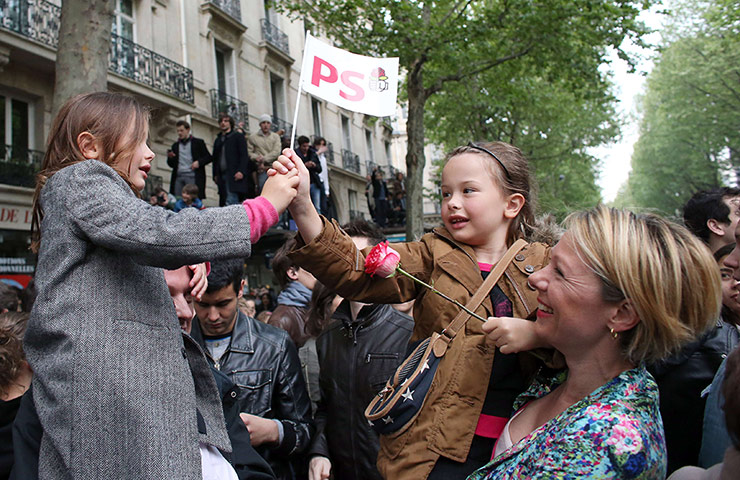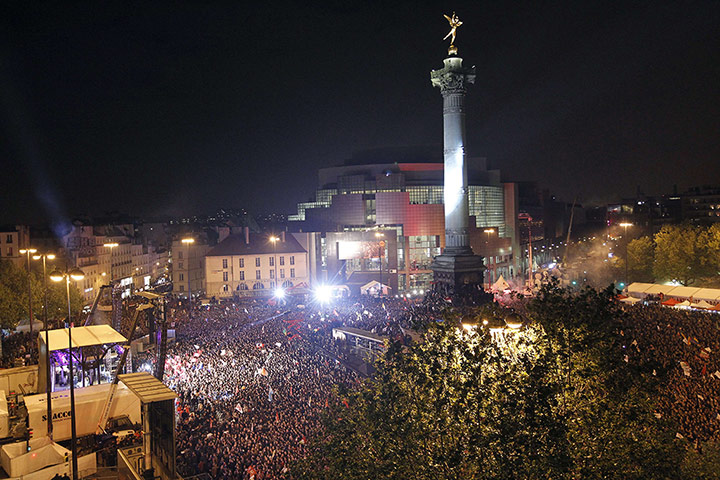Welcome to DU!
The truly grassroots left-of-center political community where regular people, not algorithms, drive the discussions and set the standards.
Join the community:
Create a free account
Support DU (and get rid of ads!):
Become a Star Member
Latest Breaking News
General Discussion
The DU Lounge
All Forums
Issue Forums
Culture Forums
Alliance Forums
Region Forums
Support Forums
Help & Search
marmar
marmar's Journal
marmar's Journal
May 7, 2012
from the Transport Politic blog:
The board of the Port Authority of Allegheny County, serving the Pittsburgh metropolitan region, announced last week that it would have to cut services by 35% by September 2 — the largest cut ever for the agency — if it is not provided an increase in state aid. The agency expects that it will have to increase fares and lay off 500 workers. This comes a year month after the agency reduced services by 15%.
The service cuts planned would be, suffice it to say, devastating. As the maps below illustrate, the Port Authority’s austerity plans would eliminate almost half of the region’s routes. This is in a city where, according to the U.S. Census, more than 25% of households have no vehicle available and almost 20% of workers use transit to get to work — figures that are far higher than the national average or even that of the vast majority of American center cities.
Before Cuts

After Cuts

Pittsburgh, of course, is far from alone. From Boston — where a 23% fare increase and service cuts were approved a month ago — to Athens, Georgia — where night bus service is expected to be fully eliminated — American cities continue to cut their transit offerings. Friday’s U.S. national jobs report, which showed about 20,000 fewer people working in transit operations in April compared to a year ago (a 5% decline), only reinforced the fact that when it comes to transit service, cuts are the rule of the game.
What a paradox: These cutbacks are enforced even as fuel prices continue to rise and the demand for public transportation seems likely only to increase. Local revenues simply cannot keep up with demand. ...............(more)
The complete piece is at: http://www.thetransportpolitic.com/2012/05/06/the-economic-crisis-rolls-on-in-cities-like-pittsburgh/
Massive transit cuts in Pittsburgh
from the Transport Politic blog:
The board of the Port Authority of Allegheny County, serving the Pittsburgh metropolitan region, announced last week that it would have to cut services by 35% by September 2 — the largest cut ever for the agency — if it is not provided an increase in state aid. The agency expects that it will have to increase fares and lay off 500 workers. This comes a year month after the agency reduced services by 15%.
The service cuts planned would be, suffice it to say, devastating. As the maps below illustrate, the Port Authority’s austerity plans would eliminate almost half of the region’s routes. This is in a city where, according to the U.S. Census, more than 25% of households have no vehicle available and almost 20% of workers use transit to get to work — figures that are far higher than the national average or even that of the vast majority of American center cities.
Before Cuts

After Cuts

Pittsburgh, of course, is far from alone. From Boston — where a 23% fare increase and service cuts were approved a month ago — to Athens, Georgia — where night bus service is expected to be fully eliminated — American cities continue to cut their transit offerings. Friday’s U.S. national jobs report, which showed about 20,000 fewer people working in transit operations in April compared to a year ago (a 5% decline), only reinforced the fact that when it comes to transit service, cuts are the rule of the game.
What a paradox: These cutbacks are enforced even as fuel prices continue to rise and the demand for public transportation seems likely only to increase. Local revenues simply cannot keep up with demand. ...............(more)
The complete piece is at: http://www.thetransportpolitic.com/2012/05/06/the-economic-crisis-rolls-on-in-cities-like-pittsburgh/
May 7, 2012
from the Transport Politic blog:
The board of the Port Authority of Allegheny County, serving the Pittsburgh metropolitan region, announced last week that it would have to cut services by 35% by September 2 — the largest cut ever for the agency — if it is not provided an increase in state aid. The agency expects that it will have to increase fares and lay off 500 workers. This comes a year month after the agency reduced services by 15%.
The service cuts planned would be, suffice it to say, devastating. As the maps below illustrate, the Port Authority’s austerity plans would eliminate almost half of the region’s routes. This is in a city where, according to the U.S. Census, more than 25% of households have no vehicle available and almost 20% of workers use transit to get to work — figures that are far higher than the national average or even that of the vast majority of American center cities.
Before Cuts

After Cuts

Pittsburgh, of course, is far from alone. From Boston — where a 23% fare increase and service cuts were approved a month ago — to Athens, Georgia — where night bus service is expected to be fully eliminated — American cities continue to cut their transit offerings. Friday’s U.S. national jobs report, which showed about 20,000 fewer people working in transit operations in April compared to a year ago (a 5% decline), only reinforced the fact that when it comes to transit service, cuts are the rule of the game.
What a paradox: These cutbacks are enforced even as fuel prices continue to rise and the demand for public transportation seems likely only to increase. Local revenues simply cannot keep up with demand. ...............(more)
The complete piece is at: http://www.thetransportpolitic.com/2012/05/06/the-economic-crisis-rolls-on-in-cities-like-pittsburgh/
Massive transit cuts in Pittsburgh
from the Transport Politic blog:
The board of the Port Authority of Allegheny County, serving the Pittsburgh metropolitan region, announced last week that it would have to cut services by 35% by September 2 — the largest cut ever for the agency — if it is not provided an increase in state aid. The agency expects that it will have to increase fares and lay off 500 workers. This comes a year month after the agency reduced services by 15%.
The service cuts planned would be, suffice it to say, devastating. As the maps below illustrate, the Port Authority’s austerity plans would eliminate almost half of the region’s routes. This is in a city where, according to the U.S. Census, more than 25% of households have no vehicle available and almost 20% of workers use transit to get to work — figures that are far higher than the national average or even that of the vast majority of American center cities.
Before Cuts

After Cuts

Pittsburgh, of course, is far from alone. From Boston — where a 23% fare increase and service cuts were approved a month ago — to Athens, Georgia — where night bus service is expected to be fully eliminated — American cities continue to cut their transit offerings. Friday’s U.S. national jobs report, which showed about 20,000 fewer people working in transit operations in April compared to a year ago (a 5% decline), only reinforced the fact that when it comes to transit service, cuts are the rule of the game.
What a paradox: These cutbacks are enforced even as fuel prices continue to rise and the demand for public transportation seems likely only to increase. Local revenues simply cannot keep up with demand. ...............(more)
The complete piece is at: http://www.thetransportpolitic.com/2012/05/06/the-economic-crisis-rolls-on-in-cities-like-pittsburgh/
May 7, 2012
Published on Apr 27, 2012 by ChrisMartensondotcom
Bill Black is a former bank regulator who played a central role in prosecuting the corruption responsible for the S&L crisis of the late 1980s. He is one of America's top experts on financial fraud. And he laments that the US has descended into a type of crony capitalism that makes continued fraud a virtual certainty - while increasingly neutering the safeguards intended to prevent and punish such abuse.
In this extensive interview, Bill explains why financial fraud is the most damaging type of fraud and also the hardest to prosecute. He also details how, through crony capitalism, it has become much more prevalent in our markets and political system.
A warning: there's much revealed in this interview to make your blood boil. For example: the Office of Threat Supervision. In the aftermath of the S&L crisis, this office brought 3,000 administration enforcements actions (a.k.a. lawsuits) against identified perpetrators. In a number of cases, they clawed back the funds and profits that the convicted parties had fraudulently obtained.
Flash forward to the 2008 credit crisis, in which just the related household sector losses alone were over 70x greater than those seen during the entire S&L debacle. So how many criminal referrals did the same agency, the Office of Threat Supervision, make?
Zero.
Bill Black: Our System is So Flawed That Fraud is Mathematically Guaranteed
Published on Apr 27, 2012 by ChrisMartensondotcom
Bill Black is a former bank regulator who played a central role in prosecuting the corruption responsible for the S&L crisis of the late 1980s. He is one of America's top experts on financial fraud. And he laments that the US has descended into a type of crony capitalism that makes continued fraud a virtual certainty - while increasingly neutering the safeguards intended to prevent and punish such abuse.
In this extensive interview, Bill explains why financial fraud is the most damaging type of fraud and also the hardest to prosecute. He also details how, through crony capitalism, it has become much more prevalent in our markets and political system.
A warning: there's much revealed in this interview to make your blood boil. For example: the Office of Threat Supervision. In the aftermath of the S&L crisis, this office brought 3,000 administration enforcements actions (a.k.a. lawsuits) against identified perpetrators. In a number of cases, they clawed back the funds and profits that the convicted parties had fraudulently obtained.
Flash forward to the 2008 credit crisis, in which just the related household sector losses alone were over 70x greater than those seen during the entire S&L debacle. So how many criminal referrals did the same agency, the Office of Threat Supervision, make?
Zero.
May 7, 2012
from Too Much: A Commentary on Excess and Inequality:
Wealthy of the World, Unite — and Party!
May 6, 2012
[font color="red"]From Manhattan to Monaco, the world’s super rich are fashioning themselves into a new global tribe of footloose and stateless. The rest of us get to gawk — and foot the ultimate bill.[/font]
By Sam Pizzigati
Back in 1863, in the middle of the Civil War, a short story took the American reading public by storm. Edward Everett Hale’s “The Man Without a Country” told the tale of a poor treasonous soul sentenced to spend the rest of his life endlessly sailing the seven seas, in perpetual exile, as a prisoner aboard Navy warships.
How sad, sighed 19th-century Americans.
How quaint, muse many of our 21st-century super rich. These awesomely affluent simply do not see statelessness as a penalty. They see statelessness as a goal.
And the ranks of our contemporary “men without a country” are increasing. The number of Americans who’ve formally renounced their U.S. citizenship has jumped by over seven-fold, from 235 in 2008 to 1,780 last year. .....................(more)
The complete piece is at: http://toomuchonline.org/our-stateless-super-rich/
Wealthy of the World, Unite — and Party!
from Too Much: A Commentary on Excess and Inequality:
Wealthy of the World, Unite — and Party!
May 6, 2012
[font color="red"]From Manhattan to Monaco, the world’s super rich are fashioning themselves into a new global tribe of footloose and stateless. The rest of us get to gawk — and foot the ultimate bill.[/font]
By Sam Pizzigati
Back in 1863, in the middle of the Civil War, a short story took the American reading public by storm. Edward Everett Hale’s “The Man Without a Country” told the tale of a poor treasonous soul sentenced to spend the rest of his life endlessly sailing the seven seas, in perpetual exile, as a prisoner aboard Navy warships.
How sad, sighed 19th-century Americans.
How quaint, muse many of our 21st-century super rich. These awesomely affluent simply do not see statelessness as a penalty. They see statelessness as a goal.
And the ranks of our contemporary “men without a country” are increasing. The number of Americans who’ve formally renounced their U.S. citizenship has jumped by over seven-fold, from 235 in 2008 to 1,780 last year. .....................(more)
The complete piece is at: http://toomuchonline.org/our-stateless-super-rich/
May 7, 2012
from truthdig:
The People’s Bishop
Posted on May 7, 2012
By Chris Hedges

[font size="1"]AP/Stephanie Keith
New York City police arrest retired Episcopal Bishop George Packard during an Occupy Wall Street demonstration in December. Packard was among those trying to access a vacant lot owned by the Trinity Episcopal church.[/font]
Retired Episcopal Bishop George Packard was arrested in Vietnam Veterans Memorial Plaza in New York City on Tuesday night as he participated in the May 1 Occupy demonstrations. He and 15 other military veterans were taken into custody after they linked arms to hold the plaza against a police attempt to clear it. There were protesters behind them who, perhaps because of confusion, perhaps because of miscommunication or perhaps they were unwilling to risk arrest, melted into the urban landscape. But those in the thin line from Veterans for Peace, of which the bishop is a member, stood their ground. They were handcuffed, herded into a paddy wagon and taken to jail.
It was Packard’s second arrest as part of the Occupy protests. Last Dec. 17 he was arrested when he leapt over a fence in his flowing bishop’s robe to spearhead an attempt to occupy a vacant lot owned by Trinity Church in lower Manhattan. The December action by the Occupy movement was a response to the New York City Police Department’s storming and eradication of the encampment in Zuccotti Park. Packard will appear in court in June to face the trespassing charge that resulted. Now, because of this second arrest, he faces the possibility of three months in jail.
Packard’s moral and intellectual courage stands in stark contrast with the timidity of nearly all clergy and congregants in all of our major religious institutions. Religious leaders, in churches, synagogues and mosques, at best voice pious and empty platitudes about justice or carry out nominal acts of charity aimed at those bearing the weight of resistance in the streets. And Packard’s arrests serve as a reminder of the price that we—especially those who claim to be informed by the message of the Christian Gospel—must be willing to pay to defy the destruction visited on us all by the corporate state. He is one of the few clergy members who dare to bear a genuine Christian witness in an age that cries out in anguish for moral guidance.
‘‘Arrests are not arrests anymore,” Packard said as we talked Friday in a restaurant overlooking Zuccotti Park in New York. ‘‘They are badges of honor. They are, as you are taken away with your comrades, exhilarating. The spirit is calling us now into the streets, calling us to reject the old institutional orders. There is no going back. You can’t sit anymore in churches listening to stogy liturgies. They put you to sleep. Most of these churches are museums with floorshows. They are a caricature of what Jesus intended. Jesus would be turning over the money-changing tables in their vestibules. Those in the church may be good-hearted and even well-meaning, but they are ignoring the urgent, beckoning call to engage with the world. It is only outside the church that you will find the spirit of God and Christ. And with the rise of the Occupy movement it has become clear that the institutional church has failed. It mouths hollow statements. It publishes pale Lenten study tracts. It observes from a distance without getting its hands dirty. It makes itself feel good by doing marginal charitable works, like making cocoa for Occupy protesters or providing bathrooms from 9 to 5 at Trinity Church’s Charlotte’s Place. We don’t need these little acts of charity. We need the church to have a real presence on the Jericho Road. We need people in the church to leave their comfort zones, to turn away from the hierarchy, and this is still terrifying to a lot of people in the church and especially the church leadership.” ...................(more)
The complete piece is at: http://www.truthdig.com/report/item/the_peoples_bishop_20120507/
Chris Hedges: The People’s Bishop
from truthdig:
The People’s Bishop
Posted on May 7, 2012
By Chris Hedges

[font size="1"]AP/Stephanie Keith
New York City police arrest retired Episcopal Bishop George Packard during an Occupy Wall Street demonstration in December. Packard was among those trying to access a vacant lot owned by the Trinity Episcopal church.[/font]
Retired Episcopal Bishop George Packard was arrested in Vietnam Veterans Memorial Plaza in New York City on Tuesday night as he participated in the May 1 Occupy demonstrations. He and 15 other military veterans were taken into custody after they linked arms to hold the plaza against a police attempt to clear it. There were protesters behind them who, perhaps because of confusion, perhaps because of miscommunication or perhaps they were unwilling to risk arrest, melted into the urban landscape. But those in the thin line from Veterans for Peace, of which the bishop is a member, stood their ground. They were handcuffed, herded into a paddy wagon and taken to jail.
It was Packard’s second arrest as part of the Occupy protests. Last Dec. 17 he was arrested when he leapt over a fence in his flowing bishop’s robe to spearhead an attempt to occupy a vacant lot owned by Trinity Church in lower Manhattan. The December action by the Occupy movement was a response to the New York City Police Department’s storming and eradication of the encampment in Zuccotti Park. Packard will appear in court in June to face the trespassing charge that resulted. Now, because of this second arrest, he faces the possibility of three months in jail.
Packard’s moral and intellectual courage stands in stark contrast with the timidity of nearly all clergy and congregants in all of our major religious institutions. Religious leaders, in churches, synagogues and mosques, at best voice pious and empty platitudes about justice or carry out nominal acts of charity aimed at those bearing the weight of resistance in the streets. And Packard’s arrests serve as a reminder of the price that we—especially those who claim to be informed by the message of the Christian Gospel—must be willing to pay to defy the destruction visited on us all by the corporate state. He is one of the few clergy members who dare to bear a genuine Christian witness in an age that cries out in anguish for moral guidance.
‘‘Arrests are not arrests anymore,” Packard said as we talked Friday in a restaurant overlooking Zuccotti Park in New York. ‘‘They are badges of honor. They are, as you are taken away with your comrades, exhilarating. The spirit is calling us now into the streets, calling us to reject the old institutional orders. There is no going back. You can’t sit anymore in churches listening to stogy liturgies. They put you to sleep. Most of these churches are museums with floorshows. They are a caricature of what Jesus intended. Jesus would be turning over the money-changing tables in their vestibules. Those in the church may be good-hearted and even well-meaning, but they are ignoring the urgent, beckoning call to engage with the world. It is only outside the church that you will find the spirit of God and Christ. And with the rise of the Occupy movement it has become clear that the institutional church has failed. It mouths hollow statements. It publishes pale Lenten study tracts. It observes from a distance without getting its hands dirty. It makes itself feel good by doing marginal charitable works, like making cocoa for Occupy protesters or providing bathrooms from 9 to 5 at Trinity Church’s Charlotte’s Place. We don’t need these little acts of charity. We need the church to have a real presence on the Jericho Road. We need people in the church to leave their comfort zones, to turn away from the hierarchy, and this is still terrifying to a lot of people in the church and especially the church leadership.” ...................(more)
The complete piece is at: http://www.truthdig.com/report/item/the_peoples_bishop_20120507/
May 7, 2012
(Bloomberg) One of the more confounding aspects of the U.S. housing crisis has been the reluctance of lenders to do more to assist troubled borrowers. After all, when homes go into foreclosure, banks lose money.
Now it turns out some lenders haven’t merely been unhelpful; their actions have pushed some borrowers over the foreclosure cliff. Lenders have been imposing exorbitant insurance policies on homeowners whose regular coverage lapses or is deemed insufficient. The policies, standard homeowner’s insurance or extra coverage for wind damage, say, for Florida residents, typically cost five to 10 times what owners were previously paying, tipping many into foreclosure.
The situation has caught the attention of state regulators and the Consumer Financial Protection Bureau, which is considering rules to help homeowners avoid unwarranted “force- placed insurance.” The U.S. ought to go further and limit commissions, fine any company that knowingly overcharges a homeowner and require banks to seek competitive bids for force- placed insurance policies. Because insurance is not regulated at the federal level, states also need to play a stronger role in bringing down rates.
All mortgages require homeowners to maintain insurance on their property. Most mortgages also allow the lender to purchase insurance for the home and “force-place” it if a policy lapses or is deemed insufficient. These standard provisions are meant to protect the lender’s collateral -- the property -- if a calamity occurs. ...............(more)
The complete piece is at: http://www.bloomberg.com/news/2012-05-06/look-who-s-pushing-homeowners-off-the-foreclosure-cliff.html
Look Who’s Pushing Homeowners Off the Foreclosure Cliff
(Bloomberg) One of the more confounding aspects of the U.S. housing crisis has been the reluctance of lenders to do more to assist troubled borrowers. After all, when homes go into foreclosure, banks lose money.
Now it turns out some lenders haven’t merely been unhelpful; their actions have pushed some borrowers over the foreclosure cliff. Lenders have been imposing exorbitant insurance policies on homeowners whose regular coverage lapses or is deemed insufficient. The policies, standard homeowner’s insurance or extra coverage for wind damage, say, for Florida residents, typically cost five to 10 times what owners were previously paying, tipping many into foreclosure.
The situation has caught the attention of state regulators and the Consumer Financial Protection Bureau, which is considering rules to help homeowners avoid unwarranted “force- placed insurance.” The U.S. ought to go further and limit commissions, fine any company that knowingly overcharges a homeowner and require banks to seek competitive bids for force- placed insurance policies. Because insurance is not regulated at the federal level, states also need to play a stronger role in bringing down rates.
All mortgages require homeowners to maintain insurance on their property. Most mortgages also allow the lender to purchase insurance for the home and “force-place” it if a policy lapses or is deemed insufficient. These standard provisions are meant to protect the lender’s collateral -- the property -- if a calamity occurs. ...............(more)
The complete piece is at: http://www.bloomberg.com/news/2012-05-06/look-who-s-pushing-homeowners-off-the-foreclosure-cliff.html
May 7, 2012
Max Keiser and Stacy Herbert expose the negative power faction currently "in control" in this edited series of clips from the full "Keiser Report" show from earlier this May Day week.
Max Keiser: The Need For Mass Arrests - 99% vs Criminal Elite
Max Keiser and Stacy Herbert expose the negative power faction currently "in control" in this edited series of clips from the full "Keiser Report" show from earlier this May Day week.
May 7, 2012
from the Guardian UK:






François Hollande's victory ...... in pictures
http://www.guardian.co.uk/world/gallery/2012/may/07/francois-hollande-french-election-pictures#/?picture=389745668&index=0from the Guardian UK:






May 7, 2012
(Bloomberg) Voters in Greece and France challenged austerity as Europe’s sole prescription for the financial crisis, adding pressure on German Chancellor Angela Merkel to broaden her focus from debt reduction to save the 17-nation bloc.
Greek elections left the two biggest parties short of the clear majority to keep bailout efforts there on track. In France, Socialist Francois Hollande defeated President Nicolas Sarkozy, Merkel’s preferred partner for enforcing fiscal rigor.
“Europe is watching us,” Hollande, 57, told supporters in the central town of Tulle 90 minutes after his victory was announced. “The mission is now mine, to give European construction a growth dimension. That’s what I’ll tell our partners as soon as possible.”
Germany and France, whose leadership in fighting the crisis that began in Greece in 2009 gave rise to the partnership known as “Merkozy,” don’t have much time to patch up rifts between Merkel and Hollande. ................(more)
The complete piece is at: http://www.bloomberg.com/news/2012-05-06/end-of-merkozy-forces-germany-to-deal-with-hollande-on-crisis.html
End of Merkozy
(Bloomberg) Voters in Greece and France challenged austerity as Europe’s sole prescription for the financial crisis, adding pressure on German Chancellor Angela Merkel to broaden her focus from debt reduction to save the 17-nation bloc.
Greek elections left the two biggest parties short of the clear majority to keep bailout efforts there on track. In France, Socialist Francois Hollande defeated President Nicolas Sarkozy, Merkel’s preferred partner for enforcing fiscal rigor.
“Europe is watching us,” Hollande, 57, told supporters in the central town of Tulle 90 minutes after his victory was announced. “The mission is now mine, to give European construction a growth dimension. That’s what I’ll tell our partners as soon as possible.”
Germany and France, whose leadership in fighting the crisis that began in Greece in 2009 gave rise to the partnership known as “Merkozy,” don’t have much time to patch up rifts between Merkel and Hollande. ................(more)
The complete piece is at: http://www.bloomberg.com/news/2012-05-06/end-of-merkozy-forces-germany-to-deal-with-hollande-on-crisis.html
May 6, 2012
LOS ANGELES (MarketWatch) -- Japan's Hokkaido Electric Power Co. closed the nation's last remaining nuclear power plant in operation on Saturday, leaving Japan without any nuclear-power source for this first time in over 40 years, according to reports. In the year before Japan's catastrophic Fukushima nuclear disaster in 2011, nuclear power supplied 26.4% of the country's electricity, with more than 30 plants in operation, Kyodo News reported. The Japanese government hopes to restart two downed reactors in Fukui prefecture to deal with anticipated power shortages, but public opinion remains opposed to such a move, Kyodo reported. The last time Japan went without nuclear power was in the spring of 1970, just four years after commercial nuclear power generation began in Japan, when the nation had just two reactors.
http://www.marketwatch.com/story/japan-without-nuclear-power-first-time-since-1970-2012-05-06?link=MW_home_latest_news
Japan without nuclear power, first time since 1970
LOS ANGELES (MarketWatch) -- Japan's Hokkaido Electric Power Co. closed the nation's last remaining nuclear power plant in operation on Saturday, leaving Japan without any nuclear-power source for this first time in over 40 years, according to reports. In the year before Japan's catastrophic Fukushima nuclear disaster in 2011, nuclear power supplied 26.4% of the country's electricity, with more than 30 plants in operation, Kyodo News reported. The Japanese government hopes to restart two downed reactors in Fukui prefecture to deal with anticipated power shortages, but public opinion remains opposed to such a move, Kyodo reported. The last time Japan went without nuclear power was in the spring of 1970, just four years after commercial nuclear power generation began in Japan, when the nation had just two reactors.
http://www.marketwatch.com/story/japan-without-nuclear-power-first-time-since-1970-2012-05-06?link=MW_home_latest_news
Profile Information
Gender: MaleHometown: Detroit, MI
Member since: Fri Oct 29, 2004, 12:18 AM
Number of posts: 77,066